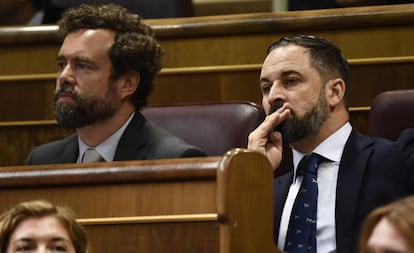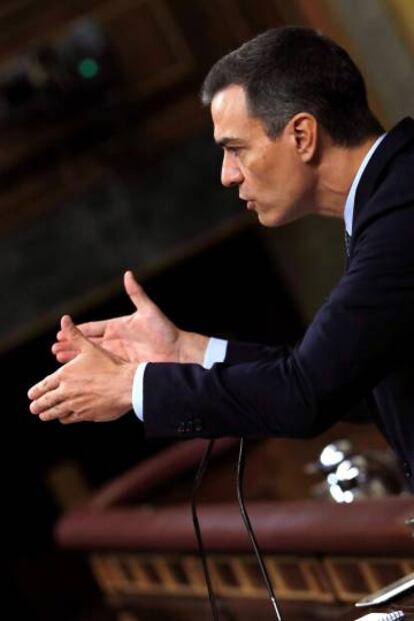Spain’s acting PM accuses center-right of shunning “the wrong party”
At Monday’s investiture debate, Pedro Sánchez argued that the far-right Vox party represents the real threat to Spanish democracy, and not his Socialist group

At a key congressional debate that will determine whether Spain gets a new government or heads for a repeat election, acting Prime Minister Pedro Sánchez on Monday admonished center-right parties for shunning his Socialist Party (PSOE) instead of the far-right Vox, which “represents the real threat to Spanish democracy.”
Have you listened to what your partner [Vox] just said?
Acting PM Pedro Sánchez
Sánchez, who won the April 28 election but fell shy of an overall majority, is struggling to secure enough support to get back into office. If he does not receive 176 affirmative votes later today, a second round will be held on Thursday, requiring just a simple majority of more yes than no votes.
But his most likely ally, Pablo Iglesias of the anti-austerity Unidas Podemos group, on Monday warned Sánchez that his party will not join a government “in a decorative capacity.” Both groups have been in talks for weeks over an acceptable power-sharing formula, but so far none appears to have emerged.
“If you fail to enter into a coalition with us out of obstinacy, I’m afraid you will never be the head of government,” said Iglesias during a tense exchange with Sánchez on Monday afternoon.
First Vox speech
The session also featured the first congressional address by Santiago Abascal, whose far-right Vox party entered Spanish institutions in December of last year, at the regional elections in Andalusia. In April, the party obtained 24 seats in Congress, making it the fifth-largest presence in the lower house of parliament.

Abascal peppered his speech with familiar phrases about “the progressive dictatorship” and “supremacist feminism.” He also defended bullfighting and hunting, and accused Sánchez of “preferring Arnaldo Otegi,” a Basque politician from the radical left who served time for ETA terrorism, “over Ortega Lara,” an ETA kidnap victim.
Abascal also had words of reproach for Pablo Casado, leader of the main opposition Popular Party (PP), whom he accused of standing by while “Spanish identity is liquidated” by the forces of “multiculturalism.”
Instead of ignoring these remarks, Sánchez used them against the leaders of the two main opposition groups, Casado of the PP and Albert Rivera of Ciudadanos. The acting PM asked why these two parties have effectively quarantined the PSOE, refusing to back Sánchez or at least abstain at the vote, when Vox is the “real threat to Spanish democracy.”
“Have you listened to what your partner just said?” he asked them right after Abascal’s speech, which he described as “rhetoric of hate and nostalgia.”
If you fail to enter into a coalition with us out of obstinacy, I’m afraid you will never be the head of government
Pablo Iglesias, head of Unidas Podemos
The real cause for concern, said Sánchez, is not just the fact that for the first time in nearly 40 years, Congress heard a “reactionary party that is questioning our model of social harmony.” The real concern, he argued, is that democratic forces are “irresponsibly” giving Vox a decisive role at the local and regional level, where the far-right party is is propping up PP-Ciudadanos governments in Andalusia, Madrid and Murcia.
After noting that in France and Germany, both liberal and conservative parties refuse to engage with the far right, Sánchez asked Casado and Rivera to listen to their European colleagues and stop cordoning off “the wrong party.”
English version by Susana Urra.
Tu suscripción se está usando en otro dispositivo
¿Quieres añadir otro usuario a tu suscripción?
Si continúas leyendo en este dispositivo, no se podrá leer en el otro.
FlechaTu suscripción se está usando en otro dispositivo y solo puedes acceder a EL PAÍS desde un dispositivo a la vez.
Si quieres compartir tu cuenta, cambia tu suscripción a la modalidad Premium, así podrás añadir otro usuario. Cada uno accederá con su propia cuenta de email, lo que os permitirá personalizar vuestra experiencia en EL PAÍS.
¿Tienes una suscripción de empresa? Accede aquí para contratar más cuentas.
En el caso de no saber quién está usando tu cuenta, te recomendamos cambiar tu contraseña aquí.
Si decides continuar compartiendo tu cuenta, este mensaje se mostrará en tu dispositivo y en el de la otra persona que está usando tu cuenta de forma indefinida, afectando a tu experiencia de lectura. Puedes consultar aquí los términos y condiciones de la suscripción digital.








































